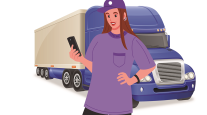Trucking Technology Q&A: Yellow's Jason Ringgenberg

[Find the latest in trucking technology: Explore this quarter's issue of iTECH]
Jason Ringgenberg joined Yellow Corp. in 2014 after more than 20 years at technology and consulting firm Accenture, where he worked with several commercial transportation clients across multiple modes, including less-than-truckload, parcel and rail. He is now Yellow's chief information officer.
“What I enjoy most is working in an industry which is so vital to economies, governments and society,” he said. “For all the bad the pandemic has brought, it has shown just how vital trucking is and that proves that truckers really are heroes!”
Through its “One Yellow” initiative, Yellow is transforming into a super-regional, less-than-truckload carrier offering both next-day regional service and national service to all points in the United States and Canada. The company’s asset-based operations utilize 13,000 tractors and 42,000 trailers. Yellow, previously known as YRC Worldwide, is based in Overland Park, Kan., and ranks No. 8 on the Transport Topics Top 100 list of the largest for-hire carriers in North America.
Describe some of the most effective ways your company has used technology to improve its operations and address its unique challenges.
Technology is integrated in everything at Yellow and I work closely with our CEO and others as a member of the core leadership team. This integrated approach has enabled us to use technology as the foundation of our transformation to “One Yellow.” We have implemented solutions to consolidate sales, enable improved customer service, combine our networks, improve safety, etc. Having our leadership team actively engaged in prioritizing technology efforts ensures alignment with strategic direction.
What are some of the top day-to-day issues and concerns you encounter in your role, and how do you deal with them?
More Q1 iTECH
►How Fleets Are Winning the Race to Hire Drivers
►Clevenger: High-Tech Recruiting Battles
►TuSimple CEO Cheng Lu Outlines Vision for Autonomous Trucking
►Dysart: Auto-Written Trend Reports: Fleet Insights in Clear Words
Explore the Issue!
One constant challenge is attracting, developing and retaining talent. Our decision to enable remote work, which started before the pandemic, has helped in this area. This remains a constant focus. Another challenge is completing what IT must do to enable us to deliver competitive products and simultaneously protecting the enterprise (systems availability, solution reliability, information security, etc.) Finally, we constantly challenge ourselves to innovate, improve processes and seek ways to provide better service.
What emerging technologies are you watching most closely, and which do you believe hold the most potential to improve freight transportation?
We are continually looking at solutions that improve safety to enable us to bring all our employees home safely and reduce risks for those that share roads with our team. We decided to migrate to Oracle Cloud a few years ago. This has enabled us to standardize and consolidate processes and enable the migration to One Yellow. We fully believe that AI and machine learning will drive more operational improvements across the enterprise and improve safety.
What steps has your company taken to protect itself from cybersecurity threats?
Like many, we have increased investments and focus on information security for many years now. To protect against cyberthreats, we have a multilayered approach. First, we are doing more to educate our employees on their role. Second, we have also implemented several technologies to protect our systems and enhance our defenses. Third, we have been very good about scanning for vulnerabilities and quickly patching. Finally, we are changing processes across all of IT to better build in security from the start.
Look ahead 10 years. How do you envision the advance of technology changing the trucking industry over the next decade?
Good question. Technology will help with the decarbonization of the supply chain. Advanced clean diesel engines will continue to show emissions reductions improvements. Electric vehicles will help, especially on local and regional markets initially then move into over-the-road lanes. Technology enhancements in cleaner fuels, better mileage, improved route optimization, etc., will also improve decarbonization efforts. Computing and 5G will make trucks rolling, mini data centers and bring about improvements in safety, on-time service, notifications, actual real-time tracking and other solutions not thought of today. The recently passed Infrastructure and Investment Jobs Act contains funding not only for roads and bridges but broadband access too. This will help further the essential interplay of the interstate highway and information superhighway.
Want more news? Listen to today's daily briefing below or go here for more info:





